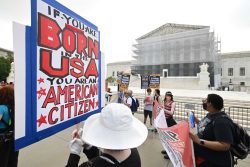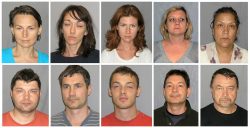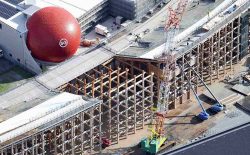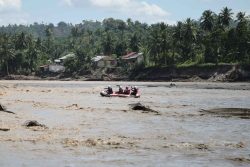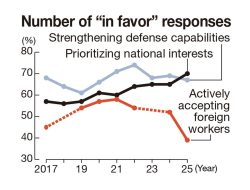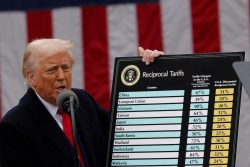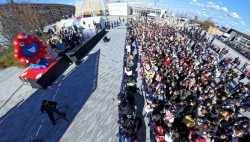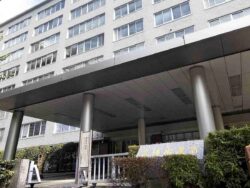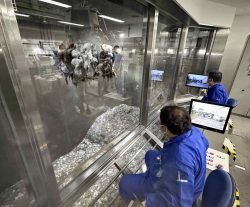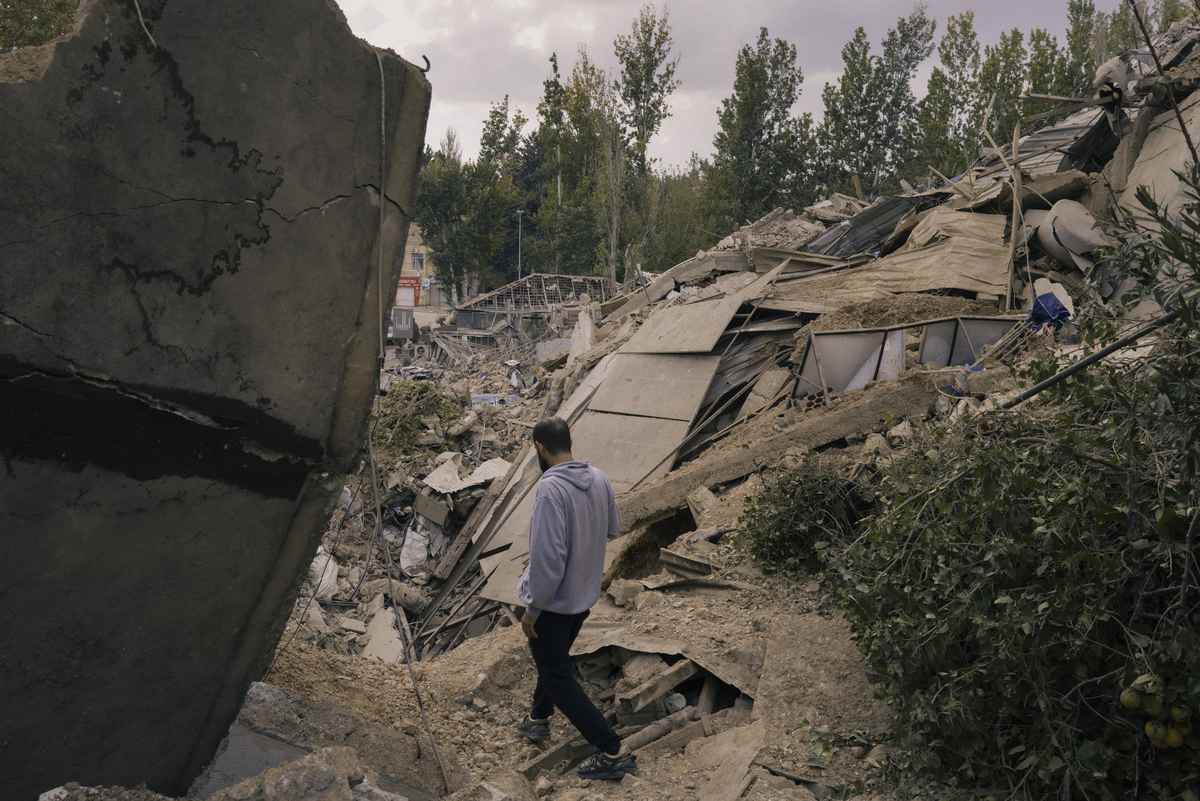
A man walks in a central area of Baalbek that was heavily damaged by Israeli bombardments.
16:54 JST, November 5, 2024
BEDNAYEL, Lebanon – The bomb that crashed into a residential building here in rural Lebanon on Friday turned the sky black, residents said. It took almost 10 minutes for them to figure out what had been hit.
In the afternoon light the next day, the remains of the two-story building were scattered over the street. The apartments had collapsed in on one another, killing eight people, Lebanese health officials said.
Last week, Israel’s military issued an evacuation order for the entire eastern city of Baalbek, home to about 100,000 people, telling residents it would “act forcefully against Hezbollah interests in your city and villages.” But most of the strikes, like the one in Bednayel, about 14 miles from Baalbek in the Bekaa Valley, have hit outside the evacuation zone.
“If they were going to bomb us, why couldn’t we be in the red area?” 23-year-old Bilal, who lives in a nearby building, asked as he stood outside the flattened complex. Like others in this article, he spoke on the condition that only a first name be used, fearing Israeli reprisals. Still others spoke on the condition of anonymity.
On Saturday, Hezbollah granted a Washington Post reporter and photographer access to the Bekaa Valley, requiring that representatives of the group accompany the team during their trip. The representatives did not arrange or take part in interviews, and Hezbollah did not review any of the reporting.
The Post talked to survivors and witnesses of four of the 14 strikes that resulted in casualties in the Baalbek region on Friday, all of which took place within approximately 90 minutes, they said. While thousands of families in Baalbek have heeded Israeli evacuation orders and are packed into schools and others shelters in surrounding communities, at least 10 of the 14 areas hit Friday were outside the evacuation zone, according to a Post review of strike locations.
By the end of Friday, at least 52 people had been killed and 76 wounded cross the Baalbek-Hermel region, according to the Lebanese Health Ministry, which does not distinguish between civilians and combatants. It was one of the deadliest days in the Bekaa Valley since Israel’s cross-border conflict with Hezbollah burst into full-scale war in late September.
The Israel Defense Forces did not respond to questions about the specific attacks, or about why so many strikes were hitting areas not covered by evacuation orders. It also didn’t answer why strikes on individual buildings were not preceded by warnings to residents, as has been done with some airstrikes in Beirut’s southern suburbs.
The most central strike Friday hit the Ras El Ein neighborhood of Baalbek – less than a mile from the city’s UNESCO-protected Roman ruins. On a normal Saturday afternoon, the leafy street in one of the world’s oldest cities would be filled with the sound of children playing in a park on the corner; families would be enjoying a leisurely lunch in the courtyard of Layalina Cafe, a tourist favorite.
Now, the block lies silent and in ruin.
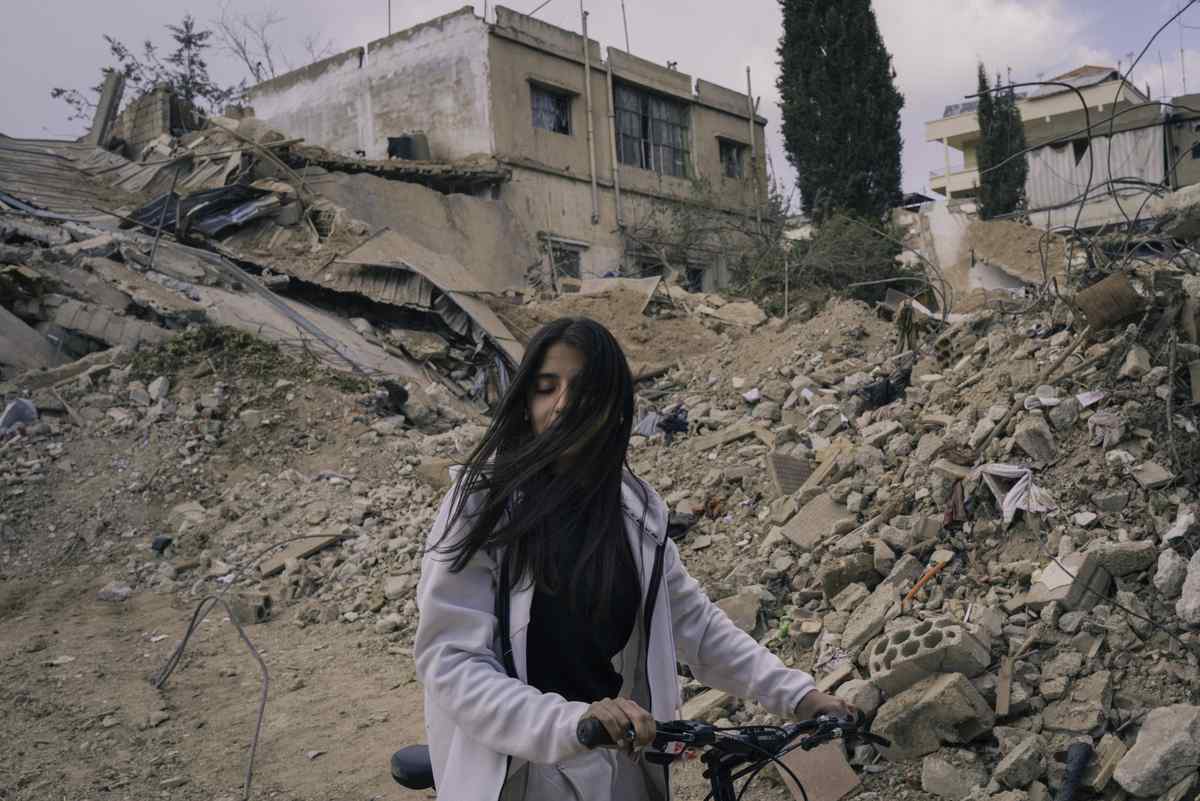
Aya rides her bike Saturday near the site of an Israeli airstrike in Baalbek. The entire city received an evacuation order last week from the Israeli military.
“It felt like an earthquake,” said Aya, 22, a local resident, pausing to take in the wreckage Saturday. She was about 200 yards away when the Israeli strike hit, she said. Aya and her family, who she said are Sunni Muslims with no ties to Hezbollah, cannot afford to leave Baalbek and do not know where to go for safety.
Although talks for a potential cease-fire in Lebanon appeared to gather momentum last week ahead of the U.S. presidential election, Israel’s aerial and ground campaign has expanded and intensified. Israeli Prime Minister Benjamin Netanyahu says the war will continue until some 60,000 displaced people – forced from their homes by Hezbollah rocket fire last October – are able to return safely to their communities in Israel’s north.
Bachir Khodr, the governor of the Baalbek-Hermel region, which stretches along Lebanon’s eastern border to the northernmost part of the country, says there have been 57 strikes in the region since Oct. 28, resulting in 145 killed and 178 wounded. Eighty-five percent of the strikes in which casualties were recorded took place outside the Israeli evacuation zone, according to a Post analysis of Khodr’s data.
The Bekaa Valley is a critical foothold for Hezbollah, partly because of its proximity to the Syrian border, which makes it a vital conduit for arms and advisers from Iran, the group’s main patron. Support for Hezbollah runs deep in Shiite Muslim communities, which rely on the extensive social welfare network it has built in one of country’s most underdeveloped areas.
The attacks, people here believe, are aimed at sapping popular sympathy for Hezbollah. Friday’s strikes overwhelmed already overstretched civil defense volunteers, who raced to dig out bodies from beneath the rubble with limited equipment. Doctors in local hospitals said the majority of the casualties they treated were children, while the second-largest group was women.
In Bednayel, Bilal pointed to his friend and neighbor, staring despondently at the rubble – his grandparents, uncles and cousins had been killed in the destroyed apartments.
“We pulled them out in pieces,” said the grandson, 20. It had taken civil defense workers and locals who rushed to help more than four hours to retrieve the remains. “I could not recognize them,” he said. Minutes later, someone found a hand in the rubble.
“Who is driving the hand to the hospital? Put it in the car – someone needs to drive it to the hospital,” one man yelled. “We need to figure out whom it belongs to.”
The grandson, neighbors and the mayor said the family had no links to Hezbollah.
“What were they targeting here?” the grandson asked, listing the ages and occupations of his dead relatives. Flies swarmed over the bodies of their sheep, nearly decapitated by shrapnel; pages of children’s books and the Quran scattered in the wind.
“They are trying to break our will and make us skeptical about the resistance,” another neighbor said, referring to Hezbollah.
“The answer is the resistance,” the mayor, Ali Suleiman, countered as he surveyed the strike site.
Eleven passersby in cars were wounded in the strike in central Baalbek, a local Hezbollah official said, though residents of the building that appeared to be the target had evacuated. A crater, strewn with carpets and clothes, marked the spot. A building next door that housed a pharmacy on its ground floor was heavily damaged. The popular restaurant was a shell of twisted metal and broken glass.
The local Hezbollah official, speaking on the condition of anonymity to discuss the damage, estimated that about a third of the city’s residents have stayed behind – some out of defiance, others simply not knowing where to go. Although there were still people on the streets Saturday, Baalbek – which has been inhabited continuously for 11,000 years – was mostly shuttered.
But it is outside the city, and the evacuation zone, where strikes have been the heaviest and the most destructive. Shattered buildings and piles of rubble line the roads on the drive through the Bekaa Valley. Local officials and hospitals say the civilian toll is mounting.
“I would never leave my children in a place if I thought it was at risk of being bombed,” said Abdulaziz, 45, who was sitting next to his injured daughter in Rayak Hospital, one of the main medical centers in the valley. “Of course I would evacuate if they told me to. What parent would not?”
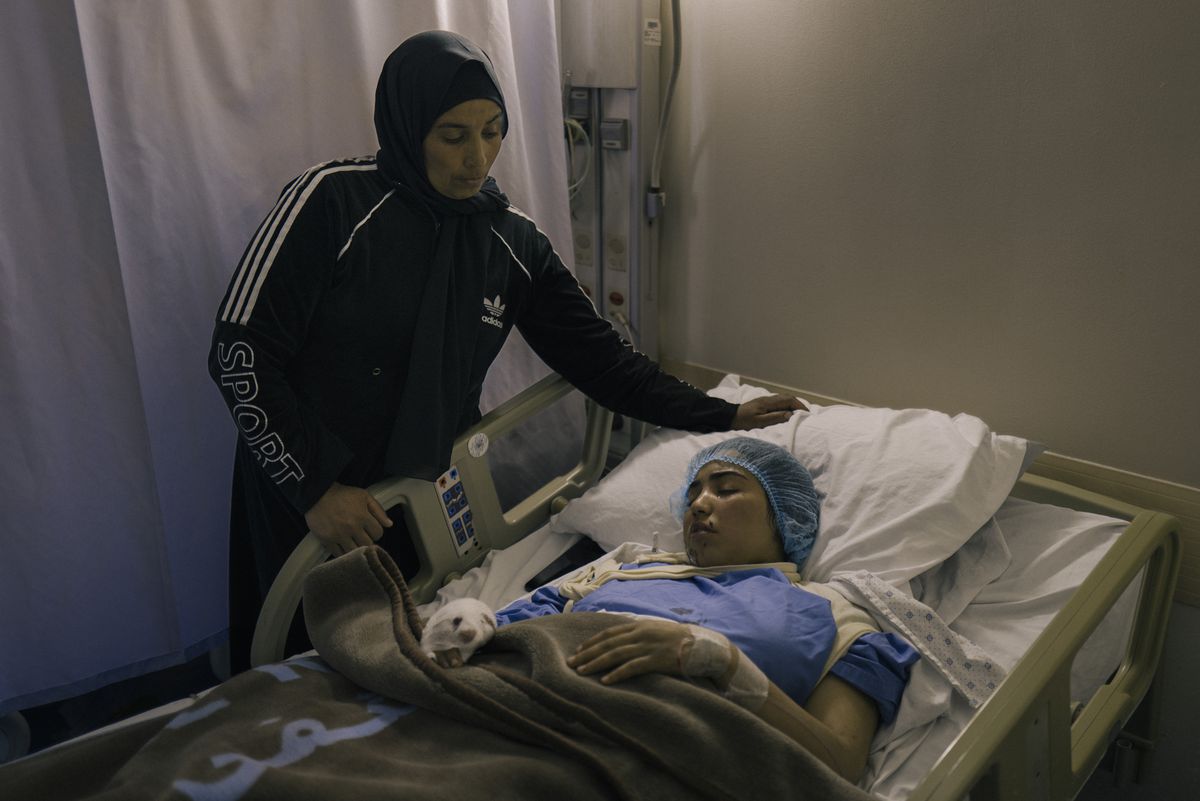
Shayma, 18, was injured in Hawsh al Nabi when an airstrike hit a building under construction as she was walking home. She is in Rayak Hospital.
His daughter, Shayma, 18, had been walking home from her grandparents’ house in Hawsh al Nabi when an airstrike hit a building under construction, he said. The force of the blast threw her at least 15 yards. She landed on her back and broke both of her shoulders, doctors found. Still in agony, she lay silent in the hospital bed, wincing as her father recounted trying to find her.
Abdulaziz has moved his family to live with relatives in a neighboring community, but that village is being hit, too.
Hassan Abdallah, one of the managers of the hospital, described the situation as “catastrophic.” They had received 35 casualties from Friday’s strikes, he said, and only two had been men.
In the hospital room next door lay Nimr, 15, who was injured in the same strike. He said he had been at home, scrolling on his phone, when the building next door was obliterated. He remembered waking up beneath the rubble. His 2-year-old cousin was killed in the strike, and his mother is in critical condition.
“It was just out of nowhere,” he said, his forehead wrapped in bandages. “I never expected once that they would bomb here. We are just civilians.”
"News Services" POPULAR ARTICLE
-

American Playwright Jeremy O. Harris Arrested in Japan on Alleged Drug Smuggling
-

Taiwan President Shows Support for Japan in China Dispute with Sushi Lunch
-

Japan Trying to Revive Wartime Militarism with Its Taiwan Comments, China’s Top Paper Says
-

Japan’s Nikkei Stock Average as JGB Yields, Yen Rise on Rate-Hike Bets
-

Japan’s Nikkei Stock Average Licks Wounds after Selloff Sparked by BOJ Hike Bets (UPDATE 1)
JN ACCESS RANKING
-
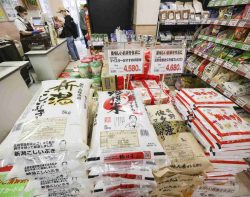
Govt Plans to Urge Municipalities to Help Residents Cope with Rising Prices
-

Essential Services Shortage to Hit Japan’s GDP By Up to ¥76 Tril. By 2040
-

Japan Prime Minister Takaichi Vows to Have Country Exit Deflation, Closely Monitor Economic Indicators
-

Japan to Charge Foreigners More for Residence Permits, Looking to Align with Western Countries
-
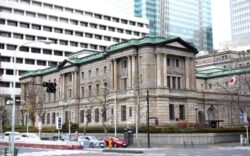
Japan GDP Down Annualized 1.8% in July-Sept.




